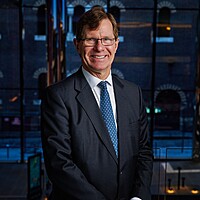Proving a focus on ESG and outperformance are not mutually exclusive
A focus on Value is the underlying philosophy of Martin Currie Australia. Value investing means that we would expect to see a positive return to fair value on any stock that we own.
The core principles of this approach are combined with our sustainability insights and encapsulated in this investment strategy - the Martin Currie Sustainable Equity Fund.
We've been building up our insights within this important field of ESG investing for the last decade, including the execution of our own proprietary work on things like modern slavery, by surveying the top 200 companies in Australia.
But whether it be modern slavery, the circular economy, the environment, or governance, the key question we ask is "Do these company activities do more harm than good?" Asking this question, and investing accordingly, has seen us outperform our benchmark the S&P/ASX 200 Accumulation Index since inception.
In this Fund in Focus, I provide an overview of the fund and how we invest. I also share several examples of the stocks we invest in and why.

Click on the player to watch the presentation or read an edited transcript below.
Edited Transcript
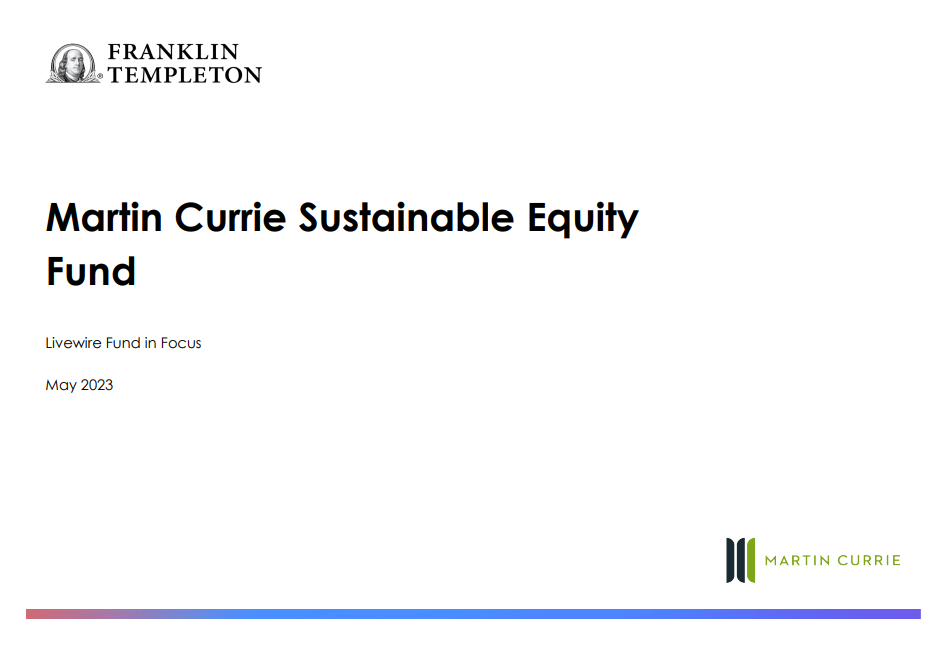
Hello, my name's Will Baylis. I'm the co-portfolio manager for the Martin Currie Sustainable Equity Fund. I work together with Naomi Bant, who is the other co-portfolio manager.
By way of background, Martin Currie is an Australian based fund manager owned by Franklin Templeton. And we are a team of approximately 18 people, of which nine of whom are very experienced investment analysts. Our team has experience of around 22 years on average, and all of us on average have been with Martin Currie for around 12 years.
The experience of our team gives us the ability to manage active equities and today I'll be talking to you about the Sustainable Equity Fund (Fund), which is one of those strategies.
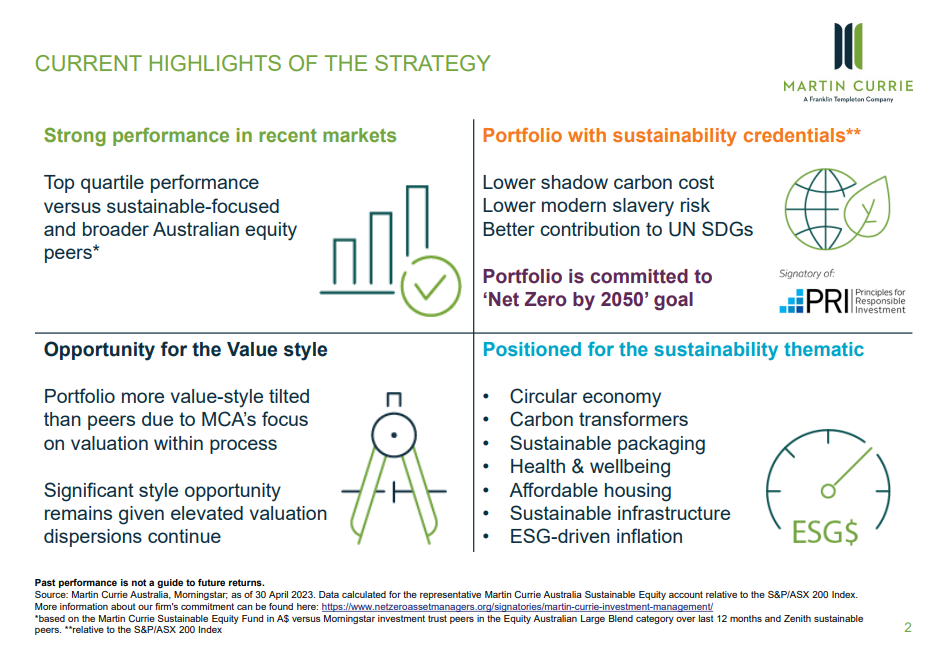
The Fund has been in operation for three years as a Sustainable Equity Fund. The background is that it used to be part of a Core fund, which was in operation for 20 years, but with client interest in sustainability and the fact that Martin Currie has developed our own proprietary work on sustainability, we decided to actually introduce a sustainable investment process, and that Fund was launched approximately three years ago.
It's had very good performance relative to the peer group, as you'll see later on in this presentation. Importantly, the underlying philosophy of Martin Currie Australia is a value investment philosophy. Value investing means that we would expect to see a positive return to fair value on any stock that we own. What's interesting about this Fund is we've combined our value investment philosophy with our sustainability insights. And you'll see on the top right-hand side of this slide that we explicitly measure the impact of a carbon price on the asset value and the earnings of each stock in the investment universe and in the portfolio.
We've also done our own proprietary work on modern slavery and modern slavery risk. In fact, we surveyed the top 200 companies in Australia, and we asked them 12 questions about policy, about strategy in modern slavery, and about their responsibility for modern slavery, which of course is a legal requirement in Australia. And we use the United Nations Sustainable Development Goals to prompt us to think about risk in each stock, particularly sustainability risk in each stock that we may include in the portfolio.
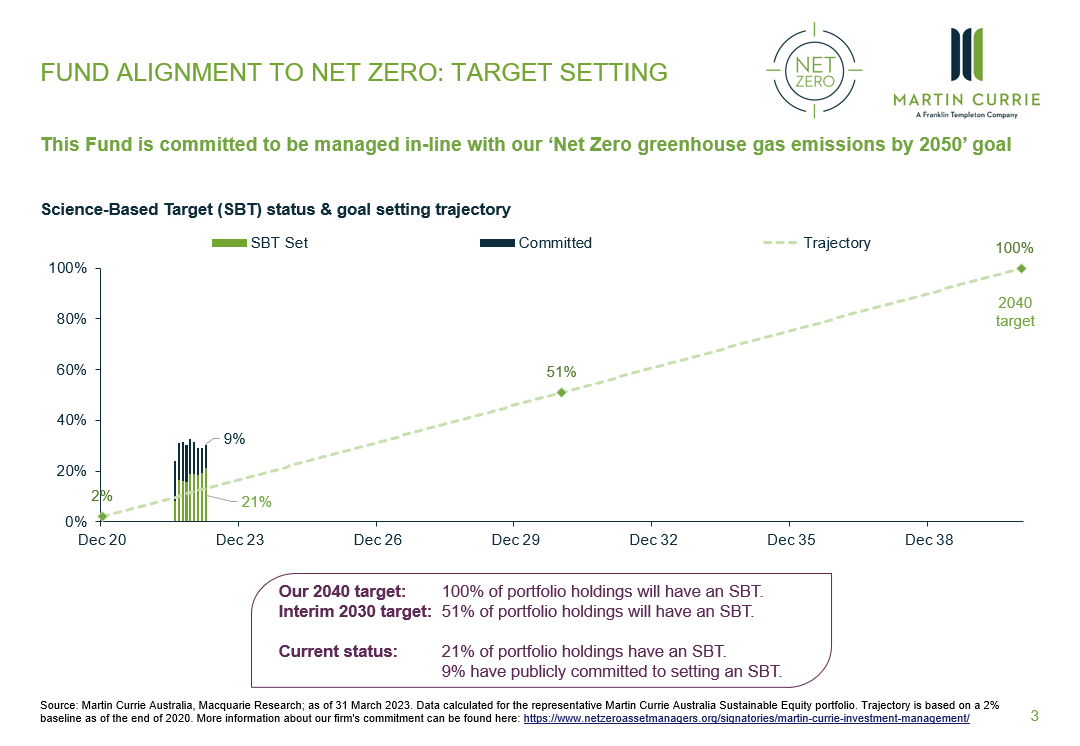
We also have committed the portfolio, using The Net Zero Asset Managers Initiative, to own companies which are all net zero carbon aspirants by 2040.
When you think about sustainability, what does it mean?
- Circular economy is one of the key characteristics and Brambles (ASX: BXB) is a great illustration of that. Brambles supplies globally pallet pools which allow their clients to ship goods quickly, efficiently, and at low cost from point A to point B, and then that pallet can be reused time and time again.
- Carbon transformers are very significant in terms of this Fund. Worley (ASX: WOR), which is an engineering consulting company, is working closely with oil and gas companies to move from fossil fuels to renewable energy solutions as quickly as can happen.
- Sustainable packaging is another key attribute. Companies like Amcor (ASX: AMC) claim that all their packaging, particularly plastic, will be fully recyclable by 2025.
- Health and wellbeing, you have a stock like EBOS (ASX: EBO), which supplies pharmaceuticals across Asia and Australia. You have a company like Medibank (ASX: MPL), which is a health services company lowering the cost and time of patients spend in hospitals.
- You have affordable housing, which Stockland (ASX: SGP) are very focused on building new communities, particularly for immigrants outside Melbourne, Brisbane, and Sydney.
- You have sustainable infrastructure, whether it be Spark (ASX: SPK) in New Zealand, which is equivalent to Telstra here in Australia, or Transurban (ASX: TCL), which of course owns and operates a number of toll roads in Australia very efficiently and has lowered the risk of car accidents quite meaningfully.
- Then you have ESG driven inflation. We've recently introduced Pilbara Minerals (ASX: PLS), which is a lithium company, and Lynas (ASX: LYC), which are benefiting as miners from very significant demand for lithium and rare earths, as we move rapidly towards this energy transformation and electrification of vehicles and basically everything else.
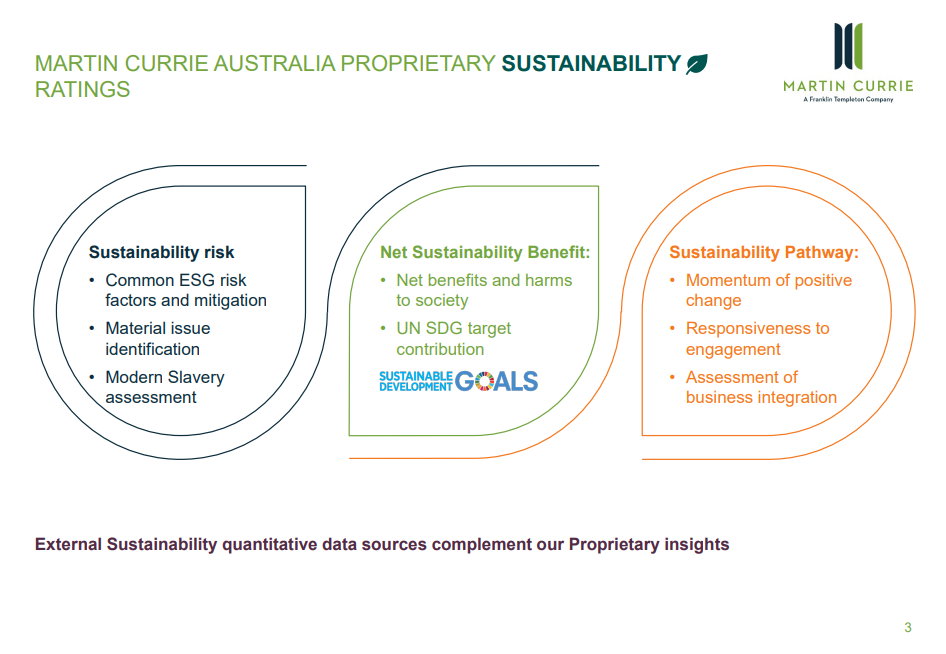
The key components of our proprietary sustainability investment philosophy are as follows. We are thinking about, for each stock, what are the key risks and what are the material issues that we can identify with those companies and how, for example, compliant are they and how active are they with modern slavery?
Take a company like Woolworths (ASX: WOW).
- Woolworths employs 120,000 people, it's a major supermarket operator. Human capital is clearly a key risk for Woolworths. And if they don't treat their staff well and they don't pay their staff well and they don't develop a really good culture, they are at risk.
- A second risk for Woolworths of course is they have data. A lot of us now use click-and-collect or even home delivery for our groceries because we're all too busy with our working lives and I can relate to that. They have data on us. Cyber risk is a major risk for Woolworths.
- A third risk, which may be less known, is that if you think about fresh food, which we all value in Australia when we go to the supermarket, a lot of that is sourced clearly from agriculture and contract labour has been a source of slavery risk for companies. Woolworths needs to be very mindful of that.
Once you've ascertained risk, then you think about, well, what are the net sustainability benefits that company brings? The Fund that I'm talking about, our Sustainable Equity Fund, it's not a do no harm fund, it's not a fund that has lots of screening. It’s a fund that invests in companies where the benefit of that company’s activities outweighs the harm.
And so, if you think about going back to Amcor, Amcor has tobacco packaging, but it also has packaging for things like fresh food and supermarkets. A lot of fresh food and supermarkets is wrapped in plastic. Amcor claim that by 2025 all of that plastic will be fully recyclable. That's a much bigger part of their business. Tobacco packaging, which is clearly harmful, is about 8% of their earnings roughly. The way we look at Amcor is that Amcor's net benefits to society are significant, or maybe another way of putting it is their benefits far outweigh their harm. Once we've done that exercise for each company in the universe, we then look at a very interesting forward-looking measure, which is the pathway.
If you think about BHP Group (ASX: BHP), BHP is on a pathway to actually a renewable sustainable future. Why? Because it's now producing copper post the OZ Minerals takeover. Nickel. It's producing met-coal. Now met-coal, how could that be a metal of the future or quantity of the future? If you don't have steel, it's very difficult to produce sustainable infrastructure. We take the view that if you are producing commodities and metals that have been used for the electrification of the world, that's going to be highly valuable to society and highly valuable to the energy transition. And so we take a much more, I think, pragmatic approach, but we also think that pathway is a really important measure of the company's future. And we also think it ties back into the company's relative rating in the market to its peer group and to the market overall.
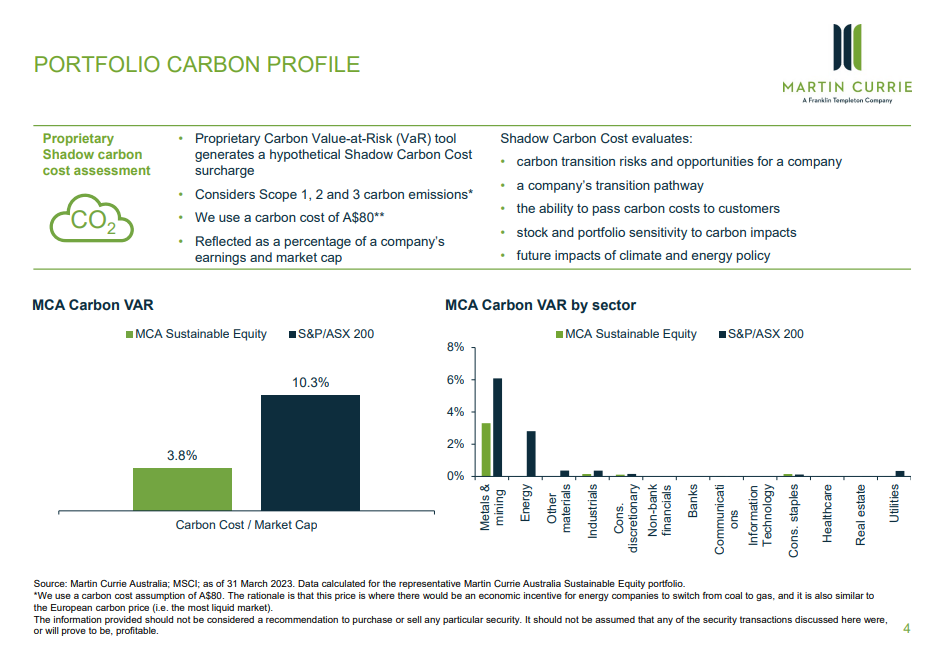
For carbon, we developed our own proprietary risk framework. We call it carbon Value at Risk (VaR), but what we've done is we've ranked companies based on whether they're a stranded asset company like a Whitehaven (ASX: WHC), which produces only thermal coal, to a company which actually generates lots of solutions like a Genesis (ASX: GNE) or a Meridian (ASX: MEZ) in New Zealand. And just to remind you, the New Zealand gen retailers are largely renewable energy companies. They have hydro, they have geothermal electricity generation, but they've been very progressive in harnessing that energy and making it fully renewable.
Importantly, once you actually rate companies across that spectrum, you then can start to work out what's their ability to pass on a carbon price or a carbon tax to their consumer? Clearly, a company in the solutions category is actually going to be actually net positive in terms of their ability to pass on carbon because they don't generate much carbon at all.
A company that's stranded will have very little opportunity to pass that on and therefore will be penalised a lot more on their asset value and also on their impact on earnings. You can see on the bottom of this slide that we can map the carbon cost to market cap for our fund compared to the market. And our ambition with this fund is to always have a much lower carbon footprint than the market. Then we can map which sectors are the biggest contributors to carbon. And not surprisingly, metals and mining is the key contributor, whereas other sectors are very benign.
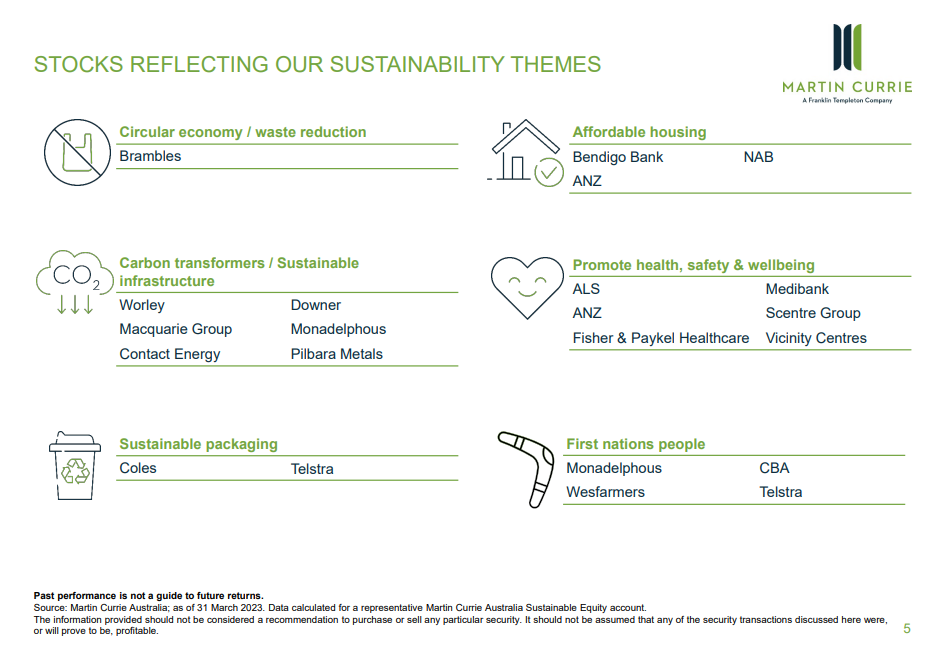
On themes, I've mentioned a few already, but Macquarie Group (ASX: MQG) under the carbon transformers is interesting. Macquarie has a green investment group. They reckon that their addressable market going forward is between $800 billion to $1 trillion dollars in terms of financing wind farms, solar farms, green hydrogen, green ammonia, and the list goes on. Macquarie, for example, are the largest financier of offshore wind farms in the United Kingdom. They are very progressive in the US and they believe that the US is now going to be, with the Inflation Reduction Act, a major driver of new initiatives and new solutions for carbon and carbon mitigation.
Affordable housing is interesting. ANZ Group Holdings (ASX: ANZ), and we actually just met with the CEO of ANZ, talks a lot in their presentation about financing affordable housing. How do they do it? They do it through sustainable bonds. They have a target of $100 billion dollars of sustainable bonds by 2030. Today they're roughly $15 billion. But they're very proactive in trying to finance companies that want to build, for example, rent to buy where the underlying company owns the land and the client builds a house. They're trying to actually solve for what's a really critical issue in Australia.
On health and safety, we own ALS Limited (ASX: ALQ). ALS for example, tests minerals, they test life sciences. One of their key divisions is the environmental division where they test for councils around the world, pollution in waterways, which is such an essential resource.
Then at the bottom of that page is First Nations people. We had a great session with Monadelphous (ASX: MND). They've been working with indigenous youth in Western Australia in particular for many, many years. They take often indigenous youth who have been incarcerated, take them out and they try and rehabilitate them and give them an opportunity in their workforce. We think that Reconciliation Action Plans and proactively employing indigenous youth, in particular, is a very admirable thing to do.
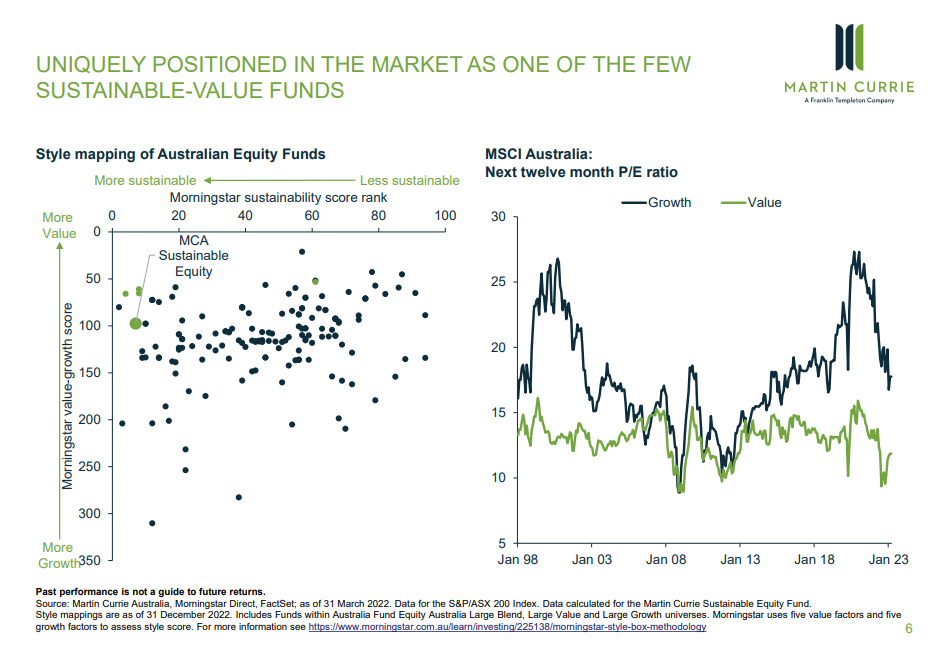
This slide talks about really how you would think about the Fund in terms of style. The left-hand side, which is a whole lot of dots, is the universe of Australian equity funds. On the top axis is Morningstar, which is a consultant, and their sustainability score. The further you get to the left of that graph, the higher your sustainability. On the left-hand side of that graph is Morningstar value-to-growth measure. The higher up on the left-hand side of the axis you are the more value you are. Now you can see the green dot is our Sustainable Equity Fund. And what makes us somewhat unique, not entirely, is that we're both a value fund, but we're highly rated on sustainability by Morningstar. And to us, that is a really interesting combination. And going to that sustainable pathway that I talked about, we believe that that is where we are going to get our alpha and our return for you.
The right-hand side simply shows you that there's still real opportunities in the value style compared to growth. And you can see the relative PEs on that graph.
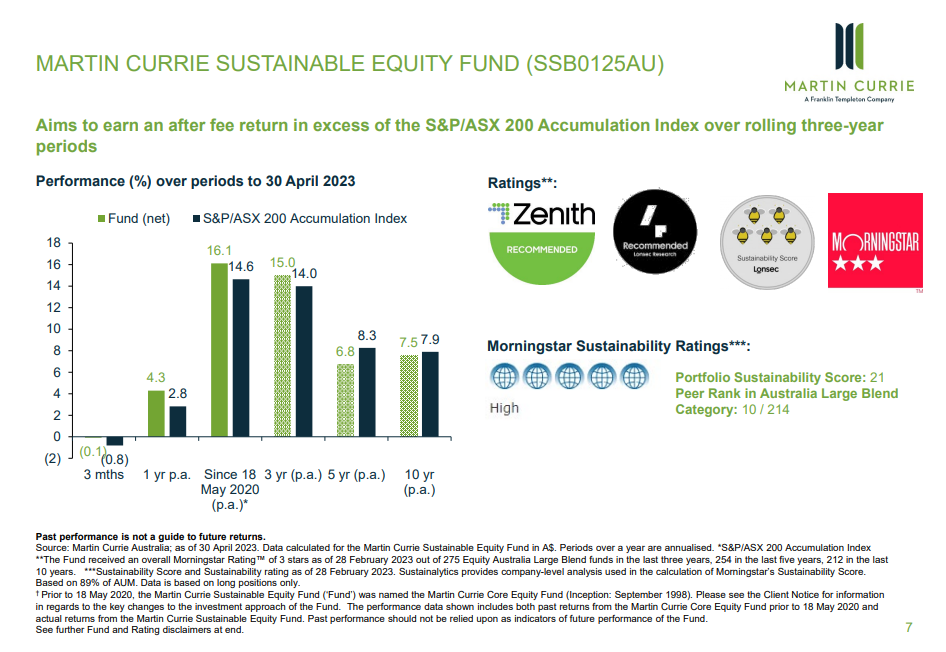
Performance, I won't dwell too much on this, but pleased to say that since inception, which was back in May, 2020, we've delivered about 1% after fees, more return than the market (the Fund’s benchmark, the S&P/ASX 200). We've delivered about 15% return per annum (net of fees, as of 30 April 2023) over the last three years. And you can see that we've got ratings by Zenith, ratings by Morningstar, ratings by Lonsec, in terms of our sustainability and overall fund ratings.
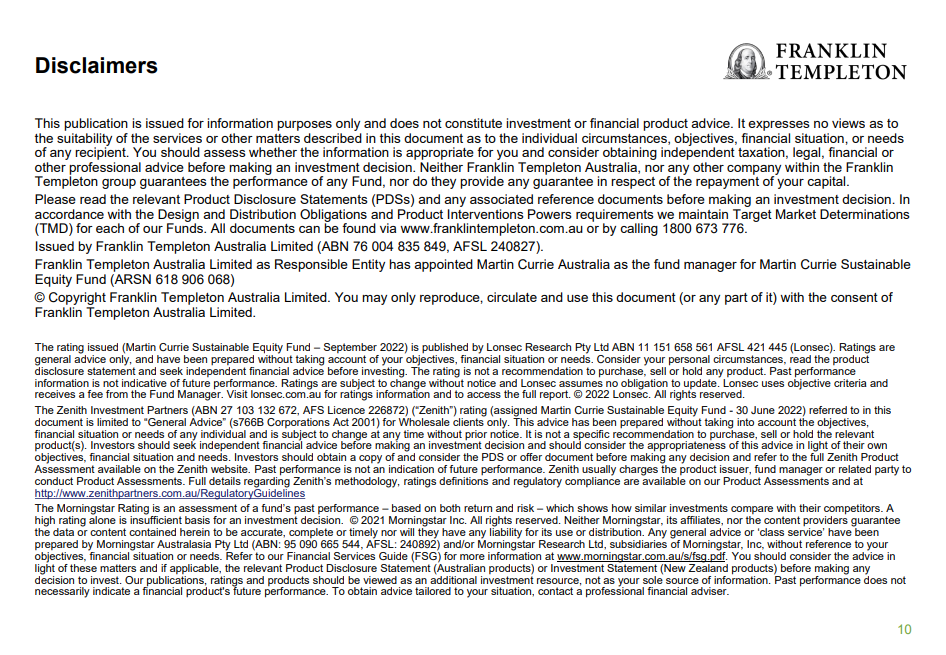
An active pathway to a Sustainable future
The Martin Currie Sustainable Equity Fund (the Fund) is designed to serve investors who are seeking to maximise returns over the longer term. The Fund invests in companies that have been assessed using MCA’s proprietary “Active Ownership” approach and ratings framework to have more favourable assessments for “Sustainability Risk”, “Net Benefits” and “Sustainability Pathway” and “Shadow Carbon Cost”.

3 topics
19 stocks mentioned
1 fund mentioned
